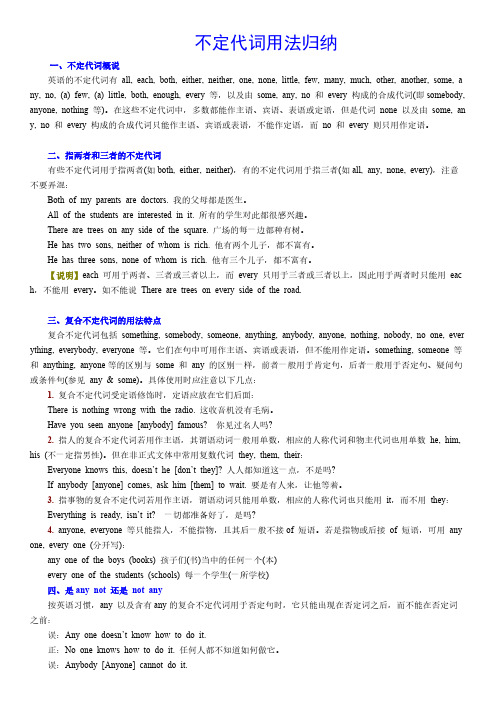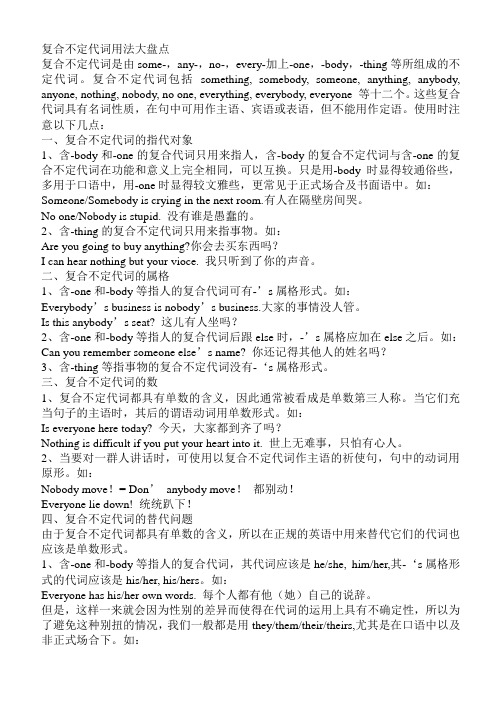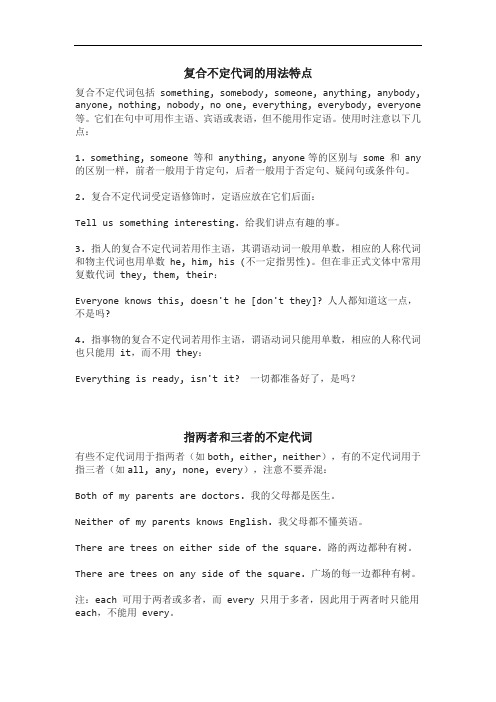在肯定句中anything与everything的区别
不定代词的用法

不定代词用法归纳一、不定代词概说英语的不定代词有all, each, both, either, neither, one, none, little, few, many, much, other, another, some, a ny, no, (a) few, (a) little, both, enough, every 等,以及由some, any, no 和every 构成的合成代词(即somebody, anyone, nothing 等)。
在这些不定代词中,多数都能作主语、宾语、表语或定语,但是代词none 以及由some, an y, no 和every 构成的合成代词只能作主语、宾语或表语,不能作定语,而no 和every 则只用作定语。
二、指两者和三者的不定代词有些不定代词用于指两者(如both, either, neither),有的不定代词用于指三者(如all, any, none, every),注意不要弄混:Both of my parents are doctors. 我的父母都是医生。
All of the students are interested in it. 所有的学生对此都很感兴趣。
There are trees on any side of the square. 广场的每一边都种有树。
He has two sons, neither of whom is rich. 他有两个儿子,都不富有。
He has three sons, none of whom is rich. 他有三个儿子,都不富有。
【说明】each 可用于两者、三者或三者以上,而every 只用于三者或三者以上,因此用于两者时只能用eac h,不能用every。
如不能说There are trees on every side of the road.三、复合不定代词的用法特点复合不定代词包括something, somebody, someone, anything, anybody, anyone, nothing, nobody, no one, ever ything, everybody, everyone 等。
复合不定代词用法大盘点

复合不定代词用法大盘点复合不定代词是由some-,any-,no-,every-加上-one,-body,-thing等所组成的不定代词。
复合不定代词包括something, somebody, someone, anything, anybody, anyone, nothing, nobody, no one, everything, everybody, everyone 等十二个。
这些复合代词具有名词性质,在句中可用作主语、宾语或表语,但不能用作定语。
使用时注意以下几点:一、复合不定代词的指代对象1、含-body和-one的复合代词只用来指人,含-body的复合不定代词与含-one的复合不定代词在功能和意义上完全相同,可以互换。
只是用-body时显得较通俗些,多用于口语中,用-one时显得较文雅些,更常见于正式场合及书面语中。
如:Someone/Somebody is crying in the next room.有人在隔壁房间哭。
No one/Nobody is stupid. 没有谁是愚蠢的。
2、含-thing的复合不定代词只用来指事物。
如:Are you going to buy anything?你会去买东西吗?I can hear nothing but your vioce. 我只听到了你的声音。
二、复合不定代词的属格1、含-one和-body等指人的复合代词可有-’s属格形式。
如:Everybody’s business is nobody’s business.大家的事情没人管。
Is this anybody’s seat? 这儿有人坐吗?2、含-one和-body等指人的复合代词后跟else时,-’s属格应加在else之后。
如:Can you remember someone else’s name? 你还记得其他人的姓名吗?3、含-thing等指事物的复合不定代词没有-‘s属格形式。
八年级上册语法归纳总结

八年级上册语法归纳总结(RJ)Lesson1: Grammar Practice1一、复合不定代词anything/something/everything/nothing的辨析指物的复合不定代词(1)指物的复合不定代词由some、any、no、every加上-thing构成。
如:something某物,anything任何事物,nothing没东西,everything每件事;一切(2)指物的复合不定代词的用法。
这些复合不定代词只具有名词性质,用作单数,在句中可用作主语、宾语和表语。
带some的一般用于肯定句,而带any的一般用于否定句和疑问句,注意:any 在肯定句中意为“任何一个”;它们的用法同some、any的用法类似。
如:Everything begins to grow in spring. 春天万物开始生长了。
Something is wrong with my watch. 我的手表坏了。
I can’t see anything.我什么也没看见。
(3)复合不定代词的特殊用法。
①用在表示“请求”、“建议”或希望得到对方肯定答复的疑问句中,some 不用变为any。
如:Would you like something to drink? 你想喝点什么吗?②复合不定代词被定语(形容词)所修饰时,定语必须放在它的后面。
如:There is something wrong with the radio. 收音机出了毛病。
二、复合不定代词someone /somebody/anyone/anybody/no one/nobody的辨析。
指人的复合不定代词(1)指人的复合不定代词一般由some, any, no, every加上-body, -one构成。
如:somebody某人,anybody任何人,nobody没人,everybody每人someone某人,anyone任何人,no one没人,everyone每人(2)指人的复合不定代词的用法。
something,anything, everything

everything, something, anything , nothing 均为指物的复合不定代词,它们作主语时,谓语动词常用单数形式everything 意为每件事;一切事,可用于肯定句、疑问句或否定句中。
如:①I hope everything goes well. 我希望一切顺利。
②Who can know everything? 谁能知道万事万物呢?something意为某事;某物,常用于肯定句中,也可用于征求对方意见的疑问句中。
如:①Something is wrong with my ears. 我的耳朵有点毛病。
②Jim, could you do something for me, please? 吉姆,请为我做点事好吗?anything 意为某事一些事,一般用于否定句或疑问句中。
如:①Can you hear anything? 你能听到某种声音吗?②You mustn't eat anything until you see the doctor. 在看医生之前不许吃任何东西。
意为任何事用于肯定句中。
如:You can ask me anything you want to know.nothing意为没有什么;没有东西。
如:Tom saw nothing. 汤姆什么也没看见nothing=not anythingeverything 最重要的. Money is everything to him.金钱对他比什么都重要。
A somethingB anythingC nothingD everything1 I want to do __________.我想做点什么事。
2 There is _________ in the box.盒子里有一些东西。
3 There isn’t _____________ in the box.4 Is there ____________ in the box?5 Are you doing ___________?6 I had ____________ to do.我没有事情做。
名校版英语语法考点解析 anything用法解析

名校版英语语法考点解析anything用法解析1.(用于否认句、疑问句也用于if或whether之后),常常译为:什么事物,什么东西,如:No one is so foolish as to believe that anything happens by chance.谁也不会愚蠢到竟然相信世间任何事情都是偶然发生的。
We can't do anything.我们什么都做不了。
Don't go doing anything extreme like leaving the country.千万不要做出诸如离开国家之类的极端行为。
Why can't you ever take anything seriously?你怎么对什么都不当回事呢?There's never anything worth watching on TV.电视上根本没有什么值得看的节目O 这里的名词表示职务、职位,不是指人的,这样的名词有: position, chairmanship, headmastership 等:He was appointed to a position of trust.他被委以重任。
She has recently been appointed to the bench.她最近当上了法官。
She has recently been appointed to the committee.她最近获委为委员会成员。
We appointed him to the committee.我们委派他为委员会成员。
She was appointed to a professorship in Economics at Princeton.她获聘为普林斯顿大学经济学教授。
He has been appointed to the chair of sociology atSouthampton University他被任命担任南安普敦大学的社会学教授一职。
复合不定代词的八种用法

复合不定代词的八种用法复合不定代词是由“some”、“any”、“no”、“every”等不定代词与“-thing”、“-body”、“-one”等词缀组成的。
它们可以用来指代未知或泛指的人、物、事情等,具有广泛的应用场景。
下面介绍八种常见的复合不定代词用法。
1. something:表示某件事情或物品,常用于肯定句中。
例如:“I want to buy something for my mom's birthday.”2. anything:表示任何事情或物品,常用于疑问句和否定句中。
例如:“Is there anything I can do to help?” “I don't have anythingto wear.”3. everything:表示所有事情或物品,常用于肯定句中。
例如:“She cleaned everything in the house.”4. nothing:表示没有任何事情或物品,常用于否定句中。
例如:“There is nothing to worry about.”5. someone:表示某个人,常用于肯定句中。
例如:“Someoneleft their keys on the table.”6. anyone:表示任何人,常用于疑问句和否定句中。
例如:“Does anyone know the answer?” “I don't want to talk to anyone right now.”7. everyone:表示所有人,常用于肯定句中。
例如:“Everyone is welcome to come to the party.”8. no one:表示没有任何人,常用于否定句中。
例如:“No one showed up for the meeting.”以上就是复合不定代词的八种常见用法。
在日常生活中,我们可以根据具体情况选择合适的复合不定代词来表达自己的意思。
译林版八年级上册期末备考:易混易错全解

译林版八年级上册期末备考:易混易错全解注意:1. something anything, nothing, everything 等其他不定代词一样,作主语时谓语动词要用第三人称单数形式。
2. 形容词修饰这些不定代词时,应位于不定代词之后。
例1单项选择 (2021江苏宿迁中考)----- Doctor, what's wrong with me -----______serious. You have just got a cold. C. Everything解析:考查不定代词词义辨析。
句 意:医生,我怎么啦没什么严重的。
你只是得了感冒。
根据答语“你只是得了感冒”可知应用否定意义的不定代词nothing 和形容词serious 连用,表示“没有什么严重的”,故选B 。
答案B----Sorry ,I really can't or three weeks ago.be is 解析:考查maybe 与may be 的用法辩析。
由答句中的“我确实记不起来了”可知,最后一句意为“大概两、三周前”故选A 。
答案A例3单项选择----Why are you so tired these days ----- Well, I have ______ homework to do. much many too too解析homework 为不可数名词,所以用too much 来修饰。
答案A易混易错四:voice, sound ,noise例4 单项选择----Listen! Who is singing----It's Betty. She has a sweet_________.B. voice解析句意听!谁在唱歌一_是Betty在唱歌。
她有甜美的嗓音。
sound 泛指一切声音;voice 嗓音;noise噪音;speech演讲。
表示嗓音要用voice.答案Binterested adj.感兴趣的; interesting adj.有趣的excited adj. 激动的; exciting adj.令人激动的例5:单项选择The film was so____that soon all the children in the cinema began feeling___with it and they went out one by one.; boring B. boring;boring C. boring;bored; ; bored解析the film为物,boring意为“令人感到无聊的”,常用来修饰事或物; all the children为人,bored意为“无聊的;厌烦的”,常用来修饰人。
中考语法-复合不定代词的用法特点

复合不定代词的用法特点复合不定代词包括 something, somebody, someone, anything, anybody, anyone, nothing, nobody, no one, everything, everybody, everyone 等。
它们在句中可用作主语、宾语或表语,但不能用作定语。
使用时注意以下几点:1. something, someone 等和 anything, anyone等的区别与 some 和 any 的区别一样,前者一般用于肯定句,后者一般用于否定句、疑问句或条件句。
2. 复合不定代词受定语修饰时,定语应放在它们后面:Tell us something interesting. 给我们讲点有趣的事。
3. 指人的复合不定代词若用作主语,其谓语动词一般用单数,相应的人称代词和物主代词也用单数 he, him, his (不一定指男性)。
但在非正式文体中常用复数代词 they, them, their:Everyone knows this, doesn't he [don't they]? 人人都知道这一点,不是吗?4. 指事物的复合不定代词若用作主语,谓语动词只能用单数,相应的人称代词也只能用 it,而不用 they:Everything is ready, isn't it? 一切都准备好了,是吗?指两者和三者的不定代词有些不定代词用于指两者(如both, either, neither),有的不定代词用于指三者(如all, any, none, every),注意不要弄混:Both of my parents are doctors. 我的父母都是医生。
Neither of my parents knows English. 我父母都不懂英语。
There are trees on either side of the square. 路的两边都种有树。
- 1、下载文档前请自行甄别文档内容的完整性,平台不提供额外的编辑、内容补充、找答案等附加服务。
- 2、"仅部分预览"的文档,不可在线预览部分如存在完整性等问题,可反馈申请退款(可完整预览的文档不适用该条件!)。
- 3、如文档侵犯您的权益,请联系客服反馈,我们会尽快为您处理(人工客服工作时间:9:00-18:30)。
在肯定句中anything与everything的区别 :
A) Anything (任何事情)
定义 : Any thing whatever; something, no matter what.
无论任何事情; 事, 无论什么.
例: Anything will be fine for me. (肯定句)
对我来说, 任何事都可以的.
B) Everything (所有的事情)
定义 : All things or all of a group of things; all.
所有的事情或一堆事物裡的全部;所有.
例: Everything is on the right track.(肯定句)
一切事情都上轨道.
***Anything 是 Everything 里的任何一事.
** 此外**
A) Anything
1)可当否定 / 条件句用 :
He will be in big trouble if anything goes wrong.
如果出了岔子, 他將会有大麻烦.
2)可当疑问句用 :
Do you have anything for a toothache? (当代名词用) 你有什么東西可止牙痛的吗?
3)可当副词用 :
定义 : In any degree; to any extent; in any way; at all.
在任何等级; 在任何程度上;以任何方式; 在所有.
例: Does it taste anything like chocolate?
嚐起來像任何巧克力口味吗?
B) Everything
1)可当代名词用 :
定义 : Something extremely important.
一些非常重要的.
例: This news means everything to us.
这个消息对我们意味着一切.
2)可当名词用 :
定义 : Something that is extremely or most important.
一些极其或最重要的.
例: Money is his everything.
钱是他的一切.。
